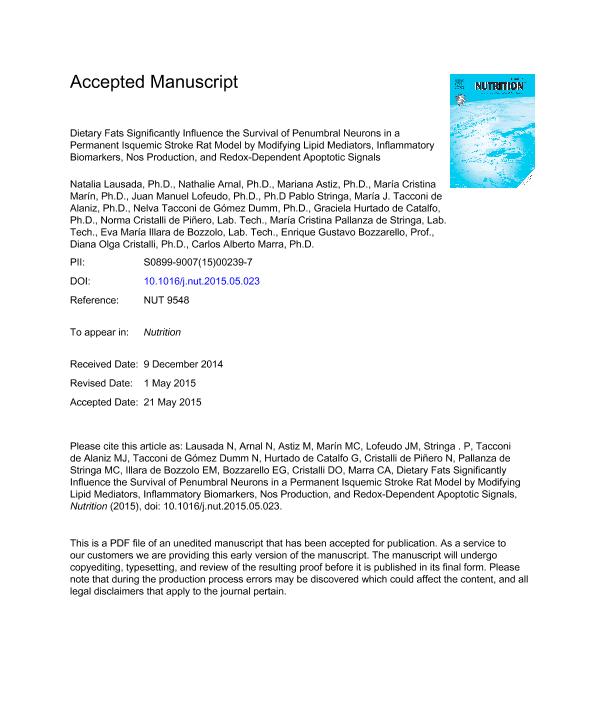Artículo
Dietary fats significantly influence the survival of penumbral neurons in a rat model of chronic ischemic by modifying lipid mediators, inflammatory biomarkers, NOS production, and redox-dependent apoptotic signals
Lausada, Natalia Raquel; Arnal, Nathalie ; Astiz, Mariana
; Astiz, Mariana ; Marin, Maria Cristina
; Marin, Maria Cristina ; Lofeudo, Juan Manuel
; Lofeudo, Juan Manuel ; Stringa, Pablo Luis
; Stringa, Pablo Luis ; Tacconi, Maria Josefa
; Tacconi, Maria Josefa ; Tacconi, Irma Nelva
; Tacconi, Irma Nelva ; Hurtado, Graciela Elisa
; Hurtado, Graciela Elisa ; Cristalli de Piñero, Norma; Pallanza, Maria Cristina
; Cristalli de Piñero, Norma; Pallanza, Maria Cristina ; Illara, Maria Eva
; Illara, Maria Eva ; Bozzarello, Enrique Gustavo; Cristalli, Diana Olga; Marra, Carlos Alberto
; Bozzarello, Enrique Gustavo; Cristalli, Diana Olga; Marra, Carlos Alberto
 ; Astiz, Mariana
; Astiz, Mariana ; Marin, Maria Cristina
; Marin, Maria Cristina ; Lofeudo, Juan Manuel
; Lofeudo, Juan Manuel ; Stringa, Pablo Luis
; Stringa, Pablo Luis ; Tacconi, Maria Josefa
; Tacconi, Maria Josefa ; Tacconi, Irma Nelva
; Tacconi, Irma Nelva ; Hurtado, Graciela Elisa
; Hurtado, Graciela Elisa ; Cristalli de Piñero, Norma; Pallanza, Maria Cristina
; Cristalli de Piñero, Norma; Pallanza, Maria Cristina ; Illara, Maria Eva
; Illara, Maria Eva ; Bozzarello, Enrique Gustavo; Cristalli, Diana Olga; Marra, Carlos Alberto
; Bozzarello, Enrique Gustavo; Cristalli, Diana Olga; Marra, Carlos Alberto
Fecha de publicación:
11/2015
Editorial:
Elsevier Science Inc
Revista:
Nutrition
ISSN:
0899-9007
Idioma:
Inglés
Tipo de recurso:
Artículo publicado
Clasificación temática:
Resumen
Objective: Brain stroke is the third most important cause of death in developed countries. We studied the effect of different dietary lipids on the outcome of a permanent ischemic stroke rat model.
Methods: Wistar rats were fed diets containing 7% commercial oils (S, soybean; O, olive; C, coconut; G, grape seed) for 35 d. Stroke was induced by permanent middle cerebral artery occlusion. Coronal slices from ischemic brains and sham-operated animals were supravitally stained. Penumbra and core volumes were calculated by image digitalization after 24, 48, and 72 h poststroke. Homogenates and mitochondrial fractions were prepared from different zones and analyzed by redox status, inflammatory markers, ceramide, and arachidonate content, phospholipase A2, NOS, and proteases.
Results: Soybean (S) and G diets were mainly prooxidative and proinflammatory by increasing the liberation of arachidonate and its transformation into prostaglandins. O was protective in terms of redox homeostatic balance, minor increases in lipid and protein damage, conservation of reduced glutathione, protective activation of NOS in penumbra, and net ratio of anti-to proinflammatory cytokines. Apoptosis (caspase-3, milli- and microcalpains) was less activated by O than by any other diet.
Conclusion: Dietary lipids modulate NOS and PLA2 activities, ceramide production, and glutathione import into the mitochondrial matrix, finally determining the activation of the two main protease systems involved in programmed cell death. Olive oil appears to be a biological source for the isolation of protective agents that block the expansion of brain core at the expense of penumbral neurons.
Archivos asociados
Licencia
Identificadores
Colecciones
Articulos(CIC)
Articulos de CENTRO DE INVEST.CARDIOVASCULARES (I)
Articulos de CENTRO DE INVEST.CARDIOVASCULARES (I)
Citación
Lausada, Natalia Raquel; Arnal, Nathalie; Astiz, Mariana; Marin, Maria Cristina; Lofeudo, Juan Manuel; et al.; Dietary fats significantly influence the survival of penumbral neurons in a rat model of chronic ischemic by modifying lipid mediators, inflammatory biomarkers, NOS production, and redox-dependent apoptotic signals; Elsevier Science Inc; Nutrition; 31; 11-12; 11-2015; 1430-1442
Compartir
Altmétricas



